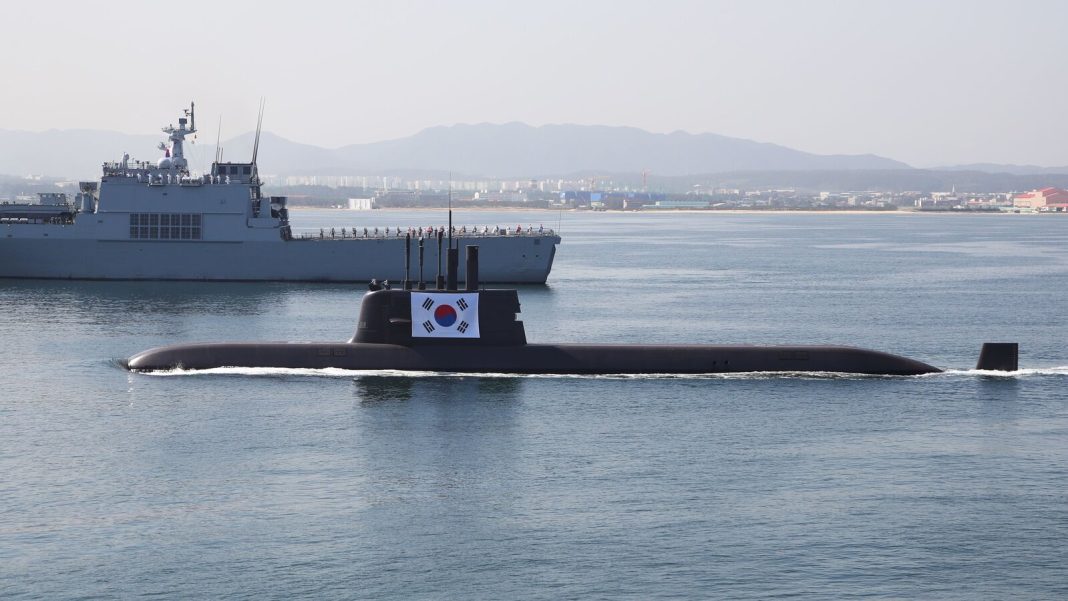U.S. President Donald Trump has once again drawn worldwide attention by announcing that he has approved South Korea to build nuclear-powered submarines at the Philadelphia Shipyard in the United States. He made the declaration on his Truth Social platform, stating that he had allowed South Korea to move beyond “old-fashioned diesel submarines” and start constructing advanced nuclear-powered ones.
Trump’s Announcement Puts Philadelphia Shipyard in the Spotlight
Trump said South Korea would build the submarines not at home but at the Philadelphia Shipyard in the United States, describing it as part of his vision to revive American shipbuilding. He claimed the move would mark a “big comeback” for the U.S. shipbuilding sector and urged his supporters to “stay tuned.”
However, Trump’s bold statement has triggered serious questions about feasibility, cost, and potential nuclear risks. Analysts argue that, while politically dramatic, the plan does not clearly explain how the Philadelphia Shipyard can handle such a massive and complex project, since it has never produced military submarines before.
Pyongyang provokes — North Korea conducts missile test just before Trump’s South Korea trip
The Philadelphia Shipyard, once focused on commercial shipbuilding, has become a symbol of industrial cooperation between the U.S. and South Korea. But experts argue that transforming it into a nuclear submarine production site would require an entirely new level of capability, including advanced nuclear safety systems, specialized technology, and extensive manpower.
Experts Question Feasibility of Philadelphia Shipyard’s Role in the Plan
Trump’s announcement followed a summit with South Korean President Lee Jae-myung, during which Seoul reportedly sought approval to acquire enriched uranium for nuclear-powered submarine propulsion. For years, South Korea has wanted U.S. consent to access such fuel, citing growing challenges in tracking Chinese and North Korean submarines in nearby waters.
But analysts have pointed out that the Philadelphia Shipyard lacks the facilities and expertise to build nuclear submarines. Moon Keun-sik, a political science professor at Hanyang University and a former naval submarine captain, explained that the shipyard builds commercial ships rather than advanced military vessels.
🇰🇷 Tariff victory, domestic defeat — South Korea’s silent service sector collapse
“Building nuclear-powered submarines is extremely complex,” Moon said. “The Philadelphia Shipyard must invest heavily and hire thousands of skilled workers before it can even start such a project.”
To address these challenges, Hanwha Group invested US$100 million to purchase the Philadelphia Shipyard and announced a US$5 billion plan to modernize it. The company included this project in a US$150 billion investment fund designed to strengthen U.S.–South Korea industrial cooperation.
The White House confirmed that this initiative will boost the shipyard’s production capacity more than tenfold and create thousands of jobs. However, experts remain doubtful that these upgrades will make the Philadelphia Shipyard capable of building nuclear-powered submarines, which demand far higher safety and technical standards than commercial vessels.
Legal Hurdles and Strategic Motives Behind the Philadelphia Shipyard Deal
Before South Korea can move forward, it must first amend its 1974 nuclear cooperation agreement with the U.S., which currently bans the use of nuclear fuel for military purposes. Seoul argues that nuclear propulsion for submarines should be treated as a non-military application.
Doo Jin-ho, a senior researcher at the Korea Research Institute for National Strategy, said the amendment is vital for South Korea’s “sovereign rights in using nuclear power.” He questioned why South Korea should build submarines at the Philadelphia Shipyard when it already has the expertise to do so at home, adding that Seoul could obtain low-enriched uranium from other countries if Washington remains hesitant.
Lee Il-woo, a naval affairs expert, suggested Trump’s plan might be more about attracting South Korean investment to the Philadelphia Shipyard than actually building submarines. “It’s about bringing money to upgrade U.S. facilities,” he said.
Even with such investments, supplying enriched uranium could face opposition from Congress and the International Atomic Energy Agency (IAEA) under the Treaty on the Non-Proliferation of Nuclear Weapons (NPT).
Canada moves to finalize submarine deal as Germany and South Korea compete for navy contract
Daryl Kimball, from the Arms Control Association, warned that this raises proliferation concerns similar to the AUKUS deal with Australia. He emphasized that South Korea does not need uranium enrichment or plutonium extraction technologies, as they could be used for weapons.
Currently, South Korea’s diesel-powered submarines can stay underwater for only 30 to 40 days, while nuclear-powered ones could last up to 100. The Philadelphia Shipyard deal, therefore, stands as both a major industrial opportunity and a complex strategic challenge clouded by legal and political hurdles.
